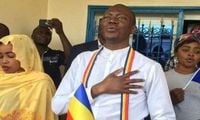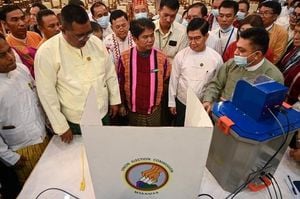Former Chadian Prime Minister and opposition leader Succes Masra has been sentenced to 20 years in prison and fined one billion CFA francs (about $1.8 million) after being convicted of inciting deadly communal violence—a verdict that has sent shockwaves through Chad’s political landscape and drawn strong reactions from across the country and beyond.
The ruling, handed down by a special criminal chamber in N’Djamena on August 9, 2025, capped a tumultuous period for Masra, who has long been one of President Mahamat Idriss Déby’s most prominent critics. According to Al Jazeera and Reuters, Masra was found guilty of disseminating racist and xenophobic messages that prosecutors argued incited violence between herders and farmers in May 2025. The resulting clashes in Logone Occidental, in southwestern Chad, left at least 35 people dead and six others injured, though some sources put the death toll over 40, with the majority of victims reportedly women and children in the town of Mandakou or Mandakao.
Masra, who led Chad’s main opposition party Les Transformateurs (the Transformers), was tried alongside nearly 70 co-defendants, most of whom belonged to the Ngambaye ethnic group. The Ngambaye are popular in Chad’s south among predominantly Christian and animist communities, groups that have long felt marginalized by the mostly Muslim authorities in the capital. The violence on May 14, 2025, according to local sources cited by AFP, was thought to have stemmed from a dispute between Fulani nomadic herders and Ngambaye farmers over land demarcation—a conflict that echoes a broader, deadly pattern. The International Crisis Group estimates that clashes between pastoralists and sedentary farmers have caused more than 1,000 deaths and 2,000 injuries in Chad between 2021 and 2024.
Masra was arrested on May 16, just two days after the violence erupted, and charged with an array of serious offenses: inciting hatred, revolt, complicity with armed gangs, complicity in murder, arson, and desecration of graves. Prosecutors had initially called for a 25-year sentence. The court ultimately imposed a 20-year term and the hefty financial penalty, which amounts to nearly 1.8 million US dollars.
Throughout the proceedings, Masra denied all charges. His defense team, led by lawyer Francis Kadjilembaye, argued that the prosecution failed to present concrete evidence linking Masra to the violence. "He has just been subjected to ignominy and unworthy humiliation," Kadjilembaye told AFP reporters after the verdict. He went further, calling the case "a weaponisation of the courts," and insisted, "He has just been convicted on the basis of an empty dossier, on the basis of assumptions and in the absence of evidence." Kadjilembaye confirmed that Masra would appeal the sentence, a move that will likely keep the case in the public eye for months to come.
Masra himself, before leaving the courtroom, delivered a brief but pointed message to his supporters: "Stand firm." Activists from the Transformers party quickly condemned the conviction and announced that Bedoumra Kordje, a former finance minister, would serve as interim party leader while Masra remains incarcerated. The party also promised a "special message" to its base later that day.
The trial and its outcome have further exposed Chad’s deep political and ethnic divisions. Masra, who is originally from Chad’s south and trained as an economist in France and Cameroon, has long been a thorn in the side of the ruling authorities. He left Chad after a bloody crackdown on his followers in 2022, only returning in 2024 under an amnesty deal. That same year, he ran against Mahamat Déby in the May 2024 presidential election. Déby, who took power in 2021 after his father Idriss Déby Itno’s death on the battlefield, won the election with more than 61 percent of the vote. Masra, however, disputed the results, claiming the vote was rigged. Despite his objections, he later agreed to serve as prime minister from January to May 2024 as part of a reconciliation deal brokered with Déby.
Masra’s brief tenure as prime minister did little to heal the rift between his supporters and the ruling government. His popularity among southern Christians and animists—groups that have long felt sidelined by the Muslim-dominated regime in N’Djamena—remained strong. After his arrest, Masra went on a hunger strike in July 2025 to protest his detention, ending it after about a week following demonstrations by women demanding his release.
The charges against Masra relate to a long-standing and deeply rooted problem in Chad: violent disputes over land between nomadic herders and farming communities. The May 2025 clashes in Logone Occidental were just the latest in a series of deadly incidents. According to local accounts, the violence was sparked by disagreements over grazing and farming boundaries—a common flashpoint in the region. Such conflicts, as noted by the International Crisis Group, have become alarmingly frequent and deadly in recent years.
The court’s decision to convict Masra and his co-defendants has drawn criticism not only from his party but also from international observers and human rights advocates. Many see the verdict as part of a broader pattern of political repression under President Déby. Critics argue that the government has repeatedly used the legal system to silence dissent and marginalize opposition voices. Supporters of the ruling party, on the other hand, maintain that the state must act decisively to prevent further violence and maintain order, especially in a country as fragile as Chad.
For now, the future of Succes Masra—and of Chad’s broader opposition movement—remains uncertain. With an appeal pending and tensions running high, the coming months will be a critical test for both the government and its critics. As Chad continues to grapple with the legacy of decades of authoritarian rule, ethnic divisions, and recurring violence, the fate of one of its most prominent opposition leaders hangs in the balance.
The conviction of Succes Masra has not only highlighted the challenges facing Chad’s democracy but also underscored the risks confronting those who dare to challenge entrenched power. Whether Masra’s appeal succeeds or fails, his case will likely resonate far beyond Chad’s borders, serving as a stark reminder of the high stakes of political dissent in a country still searching for stability and justice.




